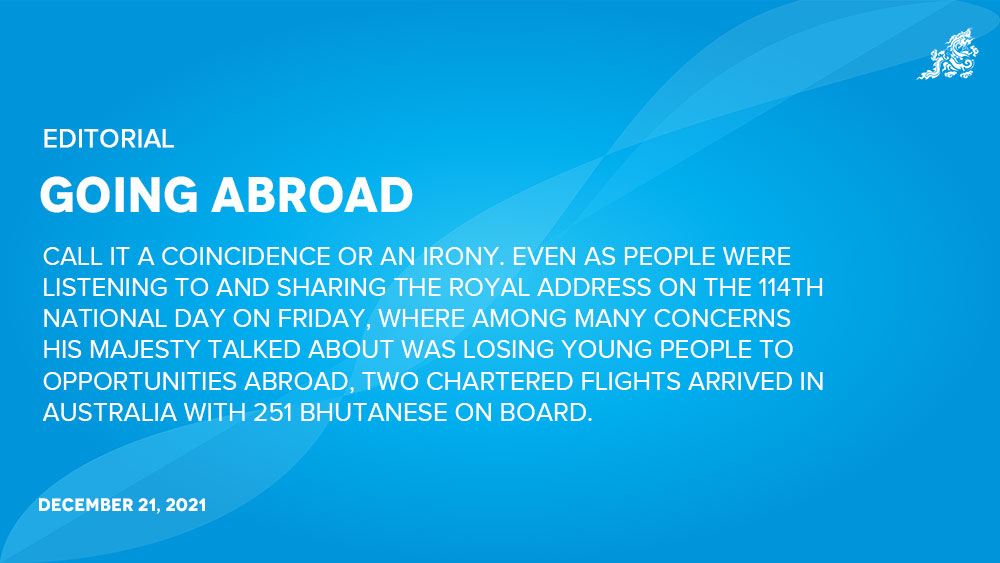Call it a coincidence or an irony. Even as people were listening to and sharing the Royal address on the 114th National Day on Friday, where among many concerns His Majesty talked about was losing young people to opportunities abroad, two chartered flights arrived in Australia with 251 Bhutanese on board.
After much delay and apprehension, Bhutanese students and their spouses or dependents, have, as many would say, accomplished their dream of studying and working in Australia. The visa grant notice from the consultancy that is arranging everything from visas to universities, and this time, even a chartered flight, sums up the reason for going Down Under. It says: “Your Door to the Future”.
Going to Australia, the US and now to Canada is seen as a gateway to better lives. They are seen as lands of opportunity. The stories are all of success, from getting quality education to making a good income and being able to invest in something to secure the future.
There is nothing wrong with seeking opportunities outside the country. The country is benefitting. For instance, in 2020 Bhutanese sent home Nu 8.269 billion in remittance. It was more than 4 percent of the GDP. Unlike many assume, Bhutanese are not only doing odd jobs, whether in the USA or Australia. We have Bhutanese entrepreneurs, professors, and many more doing what we call white collar jobs. Those holding other jobs like in grocery stores or farms are learning valuable lessons and earning as much. They take pride in their jobs and how they are making a difference in their lives.
What is concerning is how many will continue to leave. The concern is Bhutan cannot afford to let all its economically active group leave looking for greener pastures. What is more concerning is not being able to tap into the potential by creating opportunities.
The consequences were spelled out clearly in the Royal address when His Majesty said that if we are unable to create better economic opportunities for our people at home within a decade or two, there will be a scarcity of young people in Bhutan. Australia or the US may be a choice, but there are thousands of young Bhutanese in the Middle East. The opportunities are not as bright as in the developed world. And we know the risk associated with letting our young people work in faraway lands.
For many South Asian countries, remittance plays an important role in economic development often exceeding foreign direct investments. As a country guided by the philosophy of Gross National Happiness, we cannot depend on remittances, nor should it be the reason for young people leaving their motherland.
There is a difference. Bhutanese, no matter where or how successful they are, always long to come back home. Apart from creating employment, creating an environment for opportunities will help stop or make Bhutanese return home, and with the experience, create more jobs.
The Royal address, if our interpretation is not wrong, highlighted that all problems are interlinked. His Majesty had been insisting on 21st century prioritising to prepare the youth and make them competitive in a globalized world. Although the Royal priority is technological advancement like Blockchain, artificial intelligence, quantum computing or robotics, there are only a handful of people who are aware of these developments or who can understand the weight of the wisdom.
The message is clear. We should prepare our young population for both challenges and opportunities ahead.


